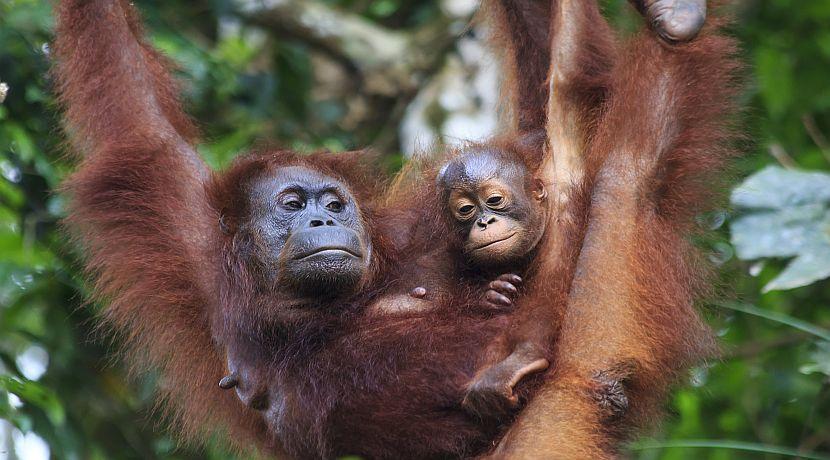On August 19th every year, International Orangutan Day rolls around in an attempt to raise awareness of the struggles these incredible animals are going through each and every day.
Just one century ago there were roughly 230,000 orangutans in total. Since then their number have declined at an alarming and almost catastrophic rate. Now it is estimated that there are only 45,000 orangutans left in the wild.
This is an 80% drop in orangutan numbers in just 100 years.

This percentage drop in the number of orangutans left on the Earth is obviously an unsustainable one, and this leads us to look at the reason as to why so many of these Great Apes have been killed.
Whilst there are a number of reasons which have contributed to the orangutans decline (poaching, the illegal pet trade, etc) the biggest killer of orangutans is the worldwide demand for Palm Oil.

Picture Credit To Rich Carey/ShutterStock
Relatively little is known about this oil which is a major ingredient in thousands of products which people use each and every day. Here at The Great Projects we want to raise awareness of anything we can which helps the orangutans, so whilst we won’t be able to stop palm oil being used, we can help you learn a little more about this destructive practise.
What is palm oil?

Palm oil is an edible vegetable oil. It is extracted from the African palm oil tree, and although the name may be misleading, these trees will flourish anywhere where heat and rainfall are in abundance. Today palm oil is grown throughout Africa, Asia, North America, and South America, but 85% of palm oil is harvested from Malaysia and Indonesia, the home of the orangutan.
What is palm oil used in?

In total, a staggering 50 million tonnes of palm oil is harvested each and every year. This huge harvest supplies over 30% of the world’s vegetable oil production. The reason why palm oil is so popular is thanks to its versatility. It can be found in anywhere from 40-50% of household goods, meaning that demand is always going to be high. Palm oil can be found in a wide variety of products including: sweets and cakes, shampoo, cosmetics, cleaning products, and even toothpaste.
What impacts does the trade in palm oil have?

Picture Credit To Rich Carey/ShutterStock
The majority of palm oil plantations are created at the expense of the bio-diversity of a region. At this current time, a third of all mammal species in Indonesia are considered critically endangered due to this process.
The animal that has been most effected is the orangutan. On International Orangutan Day 2016, we want to make people aware that 90% of the orangutans habitat has been lost in the last 20 years, and is now considered a “conservation emergency” by the U.N.
An estimated 1000-5000 orangutans are killed each year for this development, and this rate cannot continue.
Alternatives to palm oil
Fortunately there are some alternatives to the current palm oil situation, and the most important of which is sustainable palm oil. This is a method being used which aims to produce palm oil without causing deforestation or harm to the animals and people of the area.
If the Roundtable on Sustainable Palm Oil (a non-profit organisation), achieves their goal of uniting palm oil stakeholders then this would be a good start to reversing the dependency we have on unsustainable palm oil plantations.
What can you do to help?
It may not seem like you as a single person can do much to prevent this brutal trade from continuing but you can help to make a difference. Efforts can start as small as checking the products you buy in the shops are free from palm oil. If everyone collectively lowers their use of products that contain the oil, then fewer plantations will need to be created, which in turn means that less of the orangutan’s habitat will be destroyed.
It is important that on International Orangutan Day 2016 we look at the reasons why such a day is needed. Palm Oil is a destructive force in the orangutans fight for survival, and unless something changes soon, the orangutans will be gone along with their forest home.














